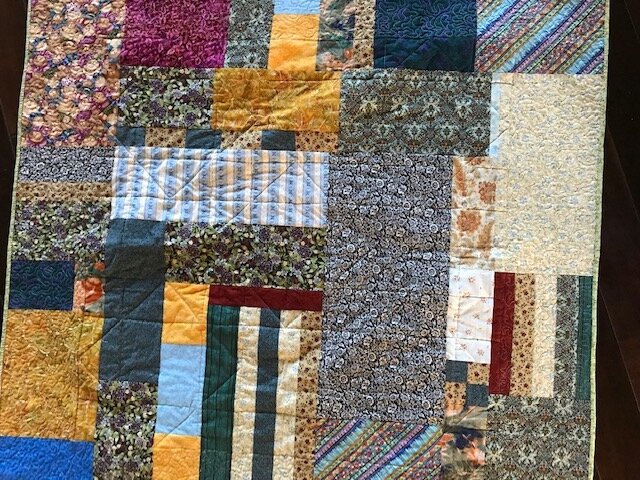I recently received this in a text from a friend who’d seen it on Facebook, so it’s made the rounds and it’s possible you’ve read it. Have a gander:
Advice from a Singer Sewing Machine Manual from 1949
Prepare yourself Mentally for Sewing. Think about what you are going to do. Never approach sewing with a sigh or lackadaisically. Good results are difficult when indifference dominates. Never try to sew with a sink full of dirty dishes or beds unmade.
When there are urgent housekeeping chores, do these first so that your mind is free to enjoy your sewing. When you sew, make yourself as attractive as possible. Put on a clean dress. Keep a little bag of French chalk near your sewing machine to dust your fingers at intervals. Have your hair in order, powder and lipstick put on. If you are constantly fearful that a visitor might drop in or your husband will come home, and you will not look neatly put together, you will not enjoy your sewing.
What hooey. It’s both alarming and hilarious. It caught my attention because I sew. Sitting behind my machine and fitting pieces together is relaxing. I certainly don’t worry about what I look like while I’m doing it. Makeup and hair? A dress? Give me a break. As to worrying about David seeing me when I don’t look my best, the man’s seen me sweaty and he’s seen me fat; he’s seen me with baby barf in my hair and zits on my chin. He doesn’t care what I look like. He cares about what’s for dinner.
I don’t know what French chalk is and I certainly don’t know why I’d want to dust my fingers with it. Does it help with hangnails? Because dry cracked cuticles has always been a problem of mine.
Also, it would be enlightening to know whether a man or woman wrote it. Considering the time period and the condescension, I assume a man.
The point here is that this is the crap my mother was taught in homemaking class when she was fourteen. No wonder she was neurotic and had self-esteem issues. That this drivel influenced an entire generation is tragic.
I decide that the suggestions are so absurd that I must read them to David.
“That sounds like great advice,” is what he says. “That comes from back when things were the way they should be.”
He’s teasing. He’s the least chauvinistic man I know. But I think the overall attitude of the thing represents the era Trump had in his hard little mind when he spoke of wanting to make America great again.
Seriously, this is what the women of my mother’s age group learned in school, what they were told to do and be. And it’s what they took with them into their adulthoods and lived out before their daughters.
When I was a child my mother would put on her makeup and do her hair first thing every morning. She never left the house without lipstick and earrings. Timid and conforming, she did all the things stay-at-home moms did—room mother, girl scout leader, Sunday school teacher. She took no pleasure in these activities, mainly because they all involved cooperation with other housewives, who could be competitive and petty. She often came back from planning meetings in tears because someone had been rude to her or had gone out of their way to make her look foolish. Well, of course they were nasty. They’d been told that they must be perfect. When you’ve been set up to fail, the only thing to do is make others look more like a failure than you. And in light of her diffident soul, they were so much better at being mean than she was.
But then came changing times for women. My mother went into the sixties as a Stepford wife and by the time the seventies were over she was divorced and independent and to hell with dressing up to sew. Though for the rest of her life she carried a fear of other women.
I, too, have always been careful about the women I trust, likely because of her influence. Based on my admittedly limited experience, I’ve always believed that working alongside other women would be difficult. Women, myself included, can be judgmental, overly sensitive, sharp-tongued, and protective when it comes to their power.
But when my sons became teenagers, and I came to know some of their friends who were girls—not necessarily girlfriends—I saw wondrous solidarity. These girls were loyal to one another. They encouraged instead of tore down. They gladly teamed up against the boys in most activities. They were clearly competitive when it came to grades. They weren’t shy about voicing their opinions or standing up for themselves. Where did all this confidence come from?
Something wonderful had happened between my generation and theirs. Women gave up fighting with each other and started supporting one another. They’ve moved smoothly into the workplace and held their own. I have two daughter-in-laws, both of whom are strong and independent. One is a corporate lawyer who works hard and loves what she does. And the other is a Belfer Center fellow who also heads the international cyber security department at Hewlett-Packard. As far as I know, neither of these successful young women has ever been told that her priority should be doing the dishes or putting on lipstick.
And that’s what I’m thankful for this Thanksgiving.
Just for fun, and because it makes a colorful picture, here’s the back of a quilt I just made.


